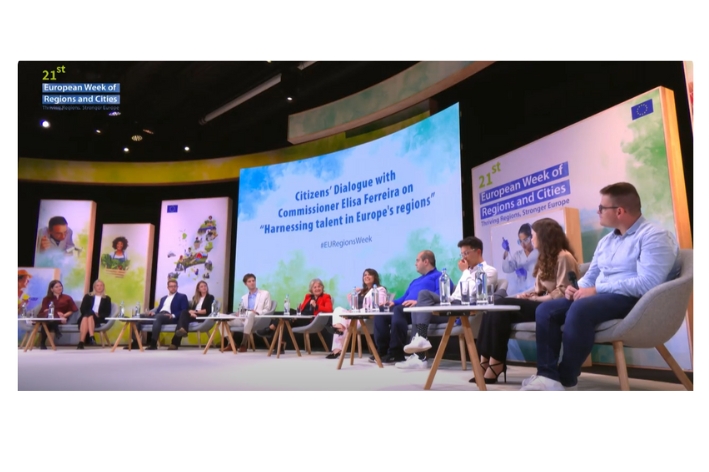In her speech at the Opening Session of the European Week of Regions and Cities 2023 on 9 October, the European commissioner for regional policy and reforms Elisa Ferreira said that the 2014-20 programmes helped supporting 2.4 million businesses, creating 350,000 jobs, making 560,000 homes energy-efficient, and developing 6000-megawatts of renewable energy sources. 85% of the funding being absorbed, the implementation is expected to accelerate with flexible programmes, such as Supporting Affordable Energy (SAFE) initiative, aimed at mobilising unspent funding towards SMEs and households most affected by high energy prices.
The new programmes will enable 73 billion euros worth investments in a more competitive Europe, while supporting 850,000 enterprises and 1.3 million additional jobs. As 3.1 million homes, and 356,000 enterprises are expected to be connected to high-speed digital infrastructure, 92 billion euros will be channelled to a greener Europe, including to improve energy performance of 723,000 homes and to create 9600 megawatts of renewable energy supply.
On the second day of the EU Regions Week, Commissioner Ferreira adopted a more citizen-focused approach by inviting 8 selected young citizens to tell their stories, to explain the reasons why they left or stayed in their place of origin and how it relates to the talent development trap and demographic decline which is affecting the EU and some of its regions.
The 5th edition of Citizens’ Dialogue, with a particular focus on brain drain and harnessing talent in Europe’s regions, heard from Marko Pavlovic, a biology and chemistry professor from Varazdin, Croatia, who set up centres for excellence to develop the skills of gifted students in order to keep them in the country. Similarly, Claudio Gomes, Theoretical Physicist from Azores, Portugal, believes that implementing the Azores Science Fair regularly helps young people to gain interest in STEM (science, technology, engineering, and mathematics) while calling for the creation for a common funding scheme with a network of researchers to support outermost regions.
Larisa Nicoleta Bejan, International Affairs Vice President of the Romanian Youth Council from Centru, Romania, believes that volunteering in international organisations, such as the European Youth Forum, is a good way to advocate for change in areas such as, low wages and corruption. Aline Mayr, Representative of the Council of the Baltic Sea States Secretariat from Baden-Württemberg, Germany, emphasised the lack of rural communities to support those who moved back or were left behind.
Julia Bergsten, Assistant at North Sweden European Office from Västerbotten, Sweden, highlighted the lack of infrastructure, such as accessible airports and railway connections, as one of the reasons she left her region. Tommaso Buso, Project manager at Bankers without boundaries from Veneto, Italy, stressed the importance of scholarship programmes, such as Crous, in attracting students while stating that the existence of universities was not sufficient without relevant tech centres or job opportunities to retain talent.
Irene Martin, Representative of Spanish Network for Rural Development from Extremadura, Spain, suggested to change the narrative that links rural areas with lack of cultural level, technology, or economic poverty. The regions would need to have a better image than depopulated or aging areas to retain students who may be afraid to become a professional or academic failure by staying in rural regions.
Commissioner Ferreira commented that the cohesion policy is about rebalancing growth adding that rural areas have a lot to offer in terms of biodiversity, tourism, research, natural resources, and heritage while big cities sometimes suffer from congestion, high living and rental costs and low quality of life. Mentioning that there is sufficient money to address these issues, such as the Recovery and Resilience Facility, which can be used to put the necessary conditions in place to allow young people to go back to their place of origin to start businesses or projects. This would entail the provision of basic services, schools, flights, trains, roads, employment, which would create the right mixture to rebalance growth. She also reiterated the need to create sophisticated conditions on top of infrastructure to add value while reminding that the EU would be attracting more people from third countries in the future due to its ageing population.
The 21st edition of the EURegionsWeek, the biggest Brussels-based event dedicated to cohesion policy, take place from Monday 9 to Thursday 12 October.
Opening session of the European Week of Regions and Cities 2023
